|
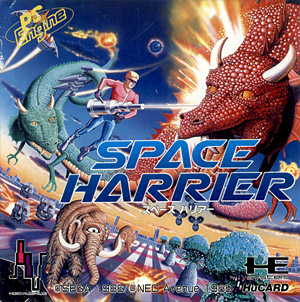
|

|
|
スペースハリアー
©Sega 1986
©NEC Avenue 1988
Release : 1988-12-09 (¥6700)
HuCard (4 Mbits) H67G1002
Shooter / 3D
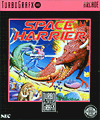

|
Released in America as
SPACE HARRIER
( TGX040025 )
|
|
Space Harrier is a 3D/forward shooter developed by Dempa and published
by Nec Avenue, and conversion
of Sega's popular arcade game originally released in 1985. The peaceful world
of Dragon Land is under attack by swarms of evil creatures. A fighter with
extraordinary powers decides to challenge the invaders, and to save the doomed planet
and its inhabitants. Space Harrier features eighteen levels and a fairly simple gameplay
mechanics - the players takes control of a warrior armed with a large laser-cannon
who can run on the ground or fly across the screen. However, the game is played from a 3D
perspective and the player must dodge trees, pillars and enemy bullets while flying at
considerable speeds through the strange landscapes of Dragon Land.
Space Harrier relies on split second reflexes, and although obstacles
can be destroyed in the first stage, most of them can't be later in the game, and the
player must constantly move around the screen while shooting at countless enemies in
order to stay alive. Two bonus levels are also scattered throughout the game, in
which the player rides a large floating dragon and must smash into elements of the
background in order to score as many points as possible.
|
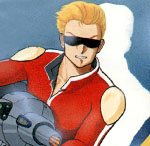 It should come as no surprise that this PC Engine conversion of
Space Harrier shows various differences with the original and blazing
fast arcade game (the advance of Sega's Super Scaler technology
and the analog control stick were definitely a challenge to emulate).
The most obvious difference is the checkerboard pattern that was replaced here by
horizontal lines. Then sprites are far smaller than the arcade, but it was most
certainly the optimal trade off to create a game that runs surprisingly close
to arcade speed. As a side note, this conversion was programed by the Japanese company Dempa which was
also responsible for porting the Fujitsu FM-7, Nec PC-8801, Sharp X1 and
Sharp X68000 versions of Space Harrier. Finally, Space Harrier was technically
the first 4 Mbits Hucard game ever released, and is apparently the only Hucard game not compatible
with the SuperGrafx system (there is however a mode switch at the back of the
console to turn it back into PC Engine mode).
It should come as no surprise that this PC Engine conversion of
Space Harrier shows various differences with the original and blazing
fast arcade game (the advance of Sega's Super Scaler technology
and the analog control stick were definitely a challenge to emulate).
The most obvious difference is the checkerboard pattern that was replaced here by
horizontal lines. Then sprites are far smaller than the arcade, but it was most
certainly the optimal trade off to create a game that runs surprisingly close
to arcade speed. As a side note, this conversion was programed by the Japanese company Dempa which was
also responsible for porting the Fujitsu FM-7, Nec PC-8801, Sharp X1 and
Sharp X68000 versions of Space Harrier. Finally, Space Harrier was technically
the first 4 Mbits Hucard game ever released, and is apparently the only Hucard game not compatible
with the SuperGrafx system (there is however a mode switch at the back of the
console to turn it back into PC Engine mode).
|
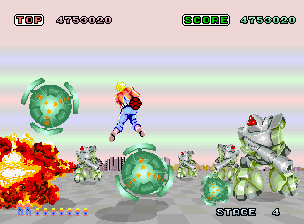 The arcade game Space Harrier was originally released by Sega in 1985
(picture on the right), and was designed by
the now popular game designer Yu Suzuki, programmer and producer of other
groundbreaking and innovative titles such as Out Run, Virtua Fighter
and the Shenmue series. Although the original arcade game was
available in a traditional upright standing machine, it also came in a sit-down type
cabinet and an incredible full-motion/rolling cockpit. The game was an instant success
and was converted/ported to countless home systems: Sega Master System (1986),
ZX Spectrum (1986),
Amstrad CPC (1986), Sharp MZ-700, Commodore 64 (1987),
Fujitsu FM-7 (1987), Sharp X68000 (1987), NEC PC-8801 (1988),
Sharp X1 (1988), PC-6001mkII, Amiga (1989), Atari ST (1989),
Famicom (1989), PC (1989), Sega Game Gear (1991), Sega 32X (1994),
Sega Saturn (1996), Playstation 2 (2003) and so forth... Other versions of the game,
including sequels, were also available for various systems - Space Harrier 2
was released for the Sega Megadrive (1988), Commodore 64 (1989), Atari ST (1990),
Amiga (1990) and ZX Spectrum (1990). Another interesting version of the game is
Space Harrier 3D released for the Sega Master System in 1988 - in addition of featuring an
entirely new (and exclusive) game, it also offers the only stereoscopic 3D version of
Space Harrier. Finally, in 2001, Sega released a 3D arcade shooter called
Planet Harriers - it was designed as a two player cabinet and used 3D
polygonal graphics.
The arcade game Space Harrier was originally released by Sega in 1985
(picture on the right), and was designed by
the now popular game designer Yu Suzuki, programmer and producer of other
groundbreaking and innovative titles such as Out Run, Virtua Fighter
and the Shenmue series. Although the original arcade game was
available in a traditional upright standing machine, it also came in a sit-down type
cabinet and an incredible full-motion/rolling cockpit. The game was an instant success
and was converted/ported to countless home systems: Sega Master System (1986),
ZX Spectrum (1986),
Amstrad CPC (1986), Sharp MZ-700, Commodore 64 (1987),
Fujitsu FM-7 (1987), Sharp X68000 (1987), NEC PC-8801 (1988),
Sharp X1 (1988), PC-6001mkII, Amiga (1989), Atari ST (1989),
Famicom (1989), PC (1989), Sega Game Gear (1991), Sega 32X (1994),
Sega Saturn (1996), Playstation 2 (2003) and so forth... Other versions of the game,
including sequels, were also available for various systems - Space Harrier 2
was released for the Sega Megadrive (1988), Commodore 64 (1989), Atari ST (1990),
Amiga (1990) and ZX Spectrum (1990). Another interesting version of the game is
Space Harrier 3D released for the Sega Master System in 1988 - in addition of featuring an
entirely new (and exclusive) game, it also offers the only stereoscopic 3D version of
Space Harrier. Finally, in 2001, Sega released a 3D arcade shooter called
Planet Harriers - it was designed as a two player cabinet and used 3D
polygonal graphics.
|
Teaser text from the American version:
The arcade hit SPACE HARRIER comes home on TurboGrafx-16! Evil forces have invaded
Dragon Land. You, as the fighting Space Harrier must battle and drive out the hostiles hordes...
armed only with an Autolock Energy Launcher and your wits. Devaste the enemy and save
Dragon Land. This arcade classic provides 18 different levels of challenge and shooting
thrills. Are your skills up to it ?
|
Game Staff (Copied from the end credits) :
|
Main Programmer
T. Kurebayashi
Music Driver
Perfect Senoko
Music Editor
Nazo1 Ken Ken
|
|
Sound Effector
Rom Writer Nasu
Graphic Coding
T. Matsushima
T. Kurebayashi
|
|
Test Player
K. Tsuchida
A. Yamashita
Special Thanks To
Daddy Naniwa
T. Tabeta
|
|
- SPACE HARRIER -
©SEGA 1986
PC ENGINE
PROGRAMMED BY
DEMPA MICOM SOFT
|
|
Game Staff (Copied from the game's manual) :
|
Executive Producer
Shigenobu Nanbu (Nec Avenue)
Producer
Daddy Naniwa (Dempa)
Toshio Tabeta (Nec Avenue)
|
|
Programer
T. Kurebayashi
Graphics
T. Matsushima
T.Kurebayashi
|
|
Music
Nazo-1 Ken Ken
Rom Writer Nase
X-Register Seno
Arrange
Dempa
|
|
Special Thanks to
Noriyuki Watanabe
Yurihito Too
Hiroshi Fukuda
©SEGA 1986
©NEC Avenue 1988
|
|
G
O
O
D
I
E
S
|
|
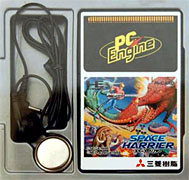
Japanese FM Radio
|
|
|
O
M
A
K
E
|
|
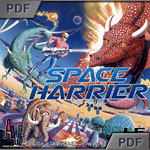
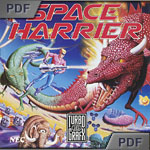
|
|
|
Click on picture to enlarge |
|
|
|
LK

|
|
Add your Pov here !
|
P
O
V
s
|
|
I've always been a huge fan of Space Harrier. Beyond the groundbreaking
graphics and jaw-dropping 3D animation (which still hold to this day) lies a
fascinating and robust game design. Enemies and background elements are really
creative, from one-eyed mammoths to mech-robots and flying dragons. Anyway, so
what about this PC Engine conversion ? Well, I think this port is excellent.
Of course the game is not as fast as the arcade, of course sprites are not as large
and of course the animation is not as smooth... but this conversion is blazing fast
and managed to capture the feel and greatness of the arcade. Controls are perfectly
responsive, which is pretty impressive for a digital controller (the original arcade
game used an analog stick) - and it is also possible to switch from a "normal"
to "reverse" mode! All in all, despite being very repetitive (this was also the
case for the arcade game), this port of Space Harrier is excellent and very
faithful to the arcade game.
|
|
|
|